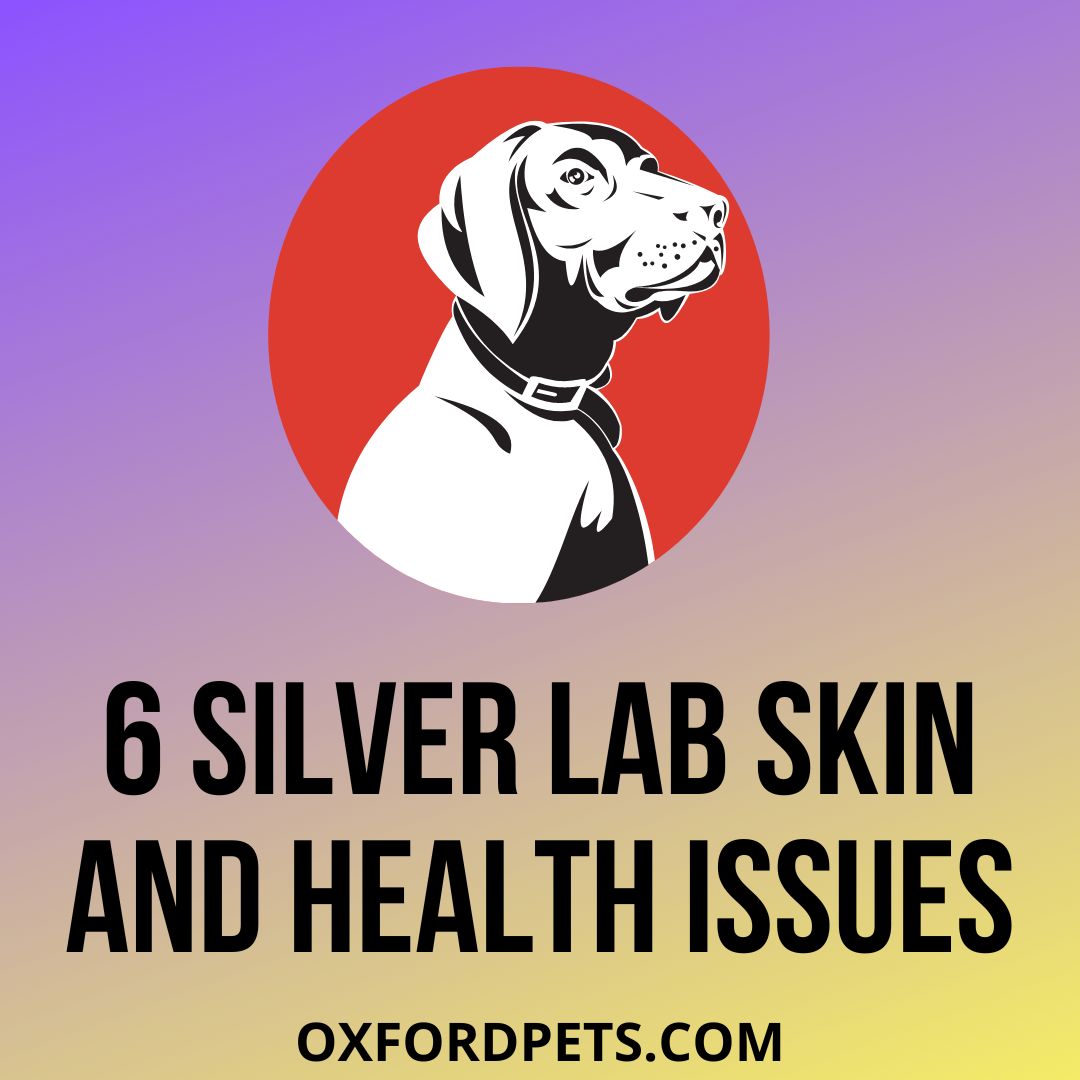Like any Labradors, Silver Labs too can suffer from a range of skin and health issues. Their rare coat color ‘Silver/greyish’ doesn’t exempt them from getting any health issues; instead, it can be a reason for carrying one. Yes, you read that right. Silver Labrador’s dilute coat color can be one reason why he suffers from several health and skin issues.
Continue reading to find out more about the same. What are the common skin and health issues a Silver Labrador suffers from?
Skin and other Health Issues in Silver Labradors can be a result of heredity and a bad lifestyle. These dogs have a recessive gene ‘dilute gene that makes them genetically different from other Labradors. The same gene is also responsible for a range of skin and health issues. But what specific issues? Below are the details about it.
Contents
6 Common Skin and Health Problems in Silver Labradors
All thanks to their coat color Silver Labradors gained immense love and popularity worldwide. However, the same dog also goes through some skin and coat-related complications for the same coat color and the responsible genes. For instance:

1) Flea allergy dermatitis (FAD)
Flea allergy dermatitis (FAD) is a common but severe allergic reaction that affects Silver Labradors. It, though, isn’t naturally occurring but a result of proteins in the flea’s saliva. When a flea hosts on a Silver Lab’s blood, they ingest its saliva deep into the dog’s skin. And because, like many dogs, Silver Labradors too are sensitive to some kind of proteins, they develop the infection rapidly. The flea attacks body parts like the tails base, hind legs, and the middle part of the spine. If your Lab is suffering from Flea allergy dermatitis (FAD), you will be able to notice symptoms like Crusted sores, Itching, Skin thickening, and hair loss (in patches).
Prevention and Treatment: Preventive measures include removing fleas from the environment and the dog’s body. Flea control measures are definitely important and even more crucial than leaving the condition for treatment. Though if the condition demands treatment, a Vet will recommend topical ointment and oral flea medications for a short while.
2) Color Dilution Alopecia (CDA)
Color Dilution Alopecia (CDA) is extremely common with Silver Labradors or other dogs with diluted coats. This recessively inherited condition is both skin and health-related concern that can most likely hit your Labrador even after ensuring utmost care.
According to Vets and Dog experts, Color Dilution Alopecia (CDA) is a result of ‘dilute gene dd’. This condition can lead to abnormalities in the hair follicles and can leave the dog with no hair. Some of the common symptoms of Color Dilution Alopecia (CDA) include hair thinning, itching, flaky skin, hair loss, and baldness. The worst part about baldness with Color Dilution Alopecia is that once it hits, there’s no way for hairs to grow back again.
Prevention and Treatment: Color Dilution Alopecia (CDA) is a genetic/ hereditary issue and thus has no possible cure. There aren’t any preventative measures as well, but dog guardians can manage the condition of their Labradors. Management tips include scaling or superficial infections, using special shampoos and ointments, oral antibiotics, and different nutritional alternatives. However, none of them could be done with the guidance of a certified Vet.
3) Canine atopic dermatitis (CAD)
Canine atopic dermatitis (CAD) is another inherited skin issue that attacks Silver Labradors and other dogs with diluted coats. Not only in dilute coat dogs, but CAD is also common in breeds like Golden and Labrador Retrievers, Hungarian Vizslas, Basset hounds, Rhodesian Ridgebacks, and more with regular coat types.
This allergic skin condition is so common that 10% of dogs worldwide are affected by it. A Silver Labrador can get Canine atopic dermatitis (CAD) simply by inhaling allergens from the environment. Some dogs also inherit the condition genetically and may have it from the time of birth. Some of the common symptoms of CAD involve itching, rough and scaly skin, and irresistible scratching. It may also lead to skin darkening if the area is continuously scratched.
Prevention and Treatment: Dogs suffering from Canine atopic dermatitis (CAD) should initially take a bath with a medicated shampoo twice weekly. Depending upon the intensity of the allergy, a Vet will also recommend topical and oral glucocorticoids, oral ciclosporin, and systemic antibiotics.
4) Hereditary myopathy
Silver Labradors inherit a lot of health problems in their DNA, and Hereditary myopathy is one of them. Hereditary myopathy is also known as centronuclear myopathy (CNM). It is basically a muscle disorder that can lead to abnormal muscle fiber structure, organization, and content. Hereditary myopathy hits right during embryonic development and is a result of a defect in the formation of muscle tissue.
Some of the common symptoms of Hereditary myopathy include muscle weakening, abnormal stance, low head carriage, stunted growth, arched back, and shrunken muscles. Dogs suffering from this condition may also experience difficulty in swallowing and would find it difficult to exercise or during heavy physical tasks like running.
Prevention and Treatment: There is no effective treatment yet found for Hereditary Myopathy. Treatment for arthritis or hip dysplasia can provide some relief in Myopathy condition, too, but that’s not long-term. Some Vets also suggest keeping the home temperature warm as it will help with the symptoms. In addition, L-carnitine supplements too can help with the condition but won’t cure it necessarily.
5) Elbow and hip dysplasia
Silver Labradors and Labrador Retrievers, in general, are prone to Elbow and Hip Dysplasia. Both of these conditions are inherited disorders of the bone and developmental abnormalities in the dog’s structure. If a dog suffers from Elbow Dysplasia, his complex elbow joints don’t mature enough. Further, as a result, these joints won’t be able to handle bones like Radius, Ulna, and Humerus. Simultaneously in Hip Dysplasia, the femur head doesn’t fit well in the hip socket, which leads to severe pain and discomfort. Both of these conditions can also be a result of excessive exercise or abnormal physical activities at a very young age.
Some of the common symptoms of Elbow and hip dysplasia include lameness, limping, stiffness, trouble getting up, imbalanced walking, excessive joint pain, bunny-hopping gait, and more.
Prevention and Treatment: Hip Dysplasia can be prevented by avoiding exercising young, with a highly nutritious diet, and by choosing the right breeder and breeding dog pair. Vets suggest joint supplements, physical therapy, weight reduction, anti-inflammatory drugs, and exercise restriction for its treatment.
For Elbow Dysplasia, Vets suggest Joint fluid modifiers, lesser stress on elbow joints, and anti-inflammatory drugs as well.
6) Gastric dilatation-volvulus
Gastric dilatation-volvulus is a life-threatening disease and disorder. It often hits dogs with large, deep-chested like Labrador Retrievers. The condition is more common in male dogs than female dogs. However, the exact cause of Gastric dilatation-volvulus is still unknown.
Gastric dilatation-volvulus could be a life-threatening emergency if not treated on time. Under this condition, dogs suffer from excessive bloating. When worsened, this can cause pathology of multiple organ systems and become fatal.
Prevention and Treatment: The treatment for Gastric dilatation-volvulus involves surgery. However, if that’s not the only solution, Vet also recommends some measures to control the condition. These measures involve:
- Weight reduction.
- Offering light meals throughout the day, or even one meal or two a day for some time.
- Dry calcium-rich food.
- Adding canned food to the diet.
Wrapping up….
Silver Labradors can suffer from a lot of Skin and Health problems; the ones mentioned above are common among the lot. The hereditary ones are often impossible to cure but can be managed by following several measures. However, the ones that are environmental or lifestyle based have treatment.
If your Silver Labrador ever face any of the above health complications, make sure you reach a Vet. Instead of relying on home remedies and internet knowledge, allow the doctor to suggest them.
